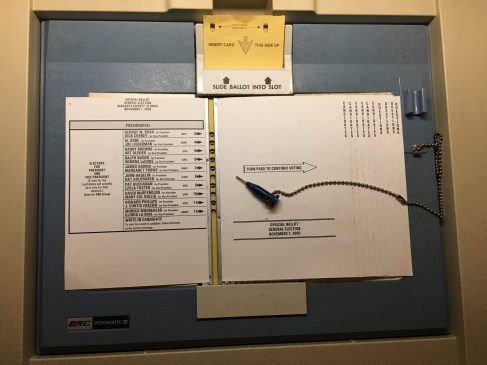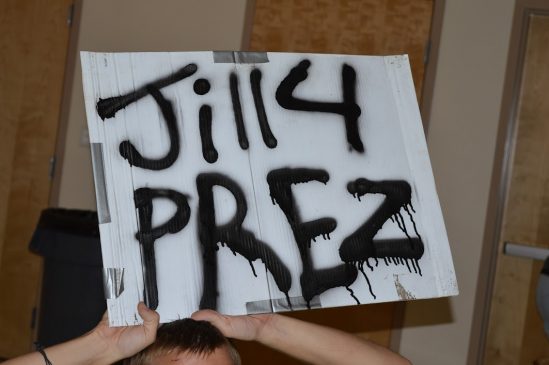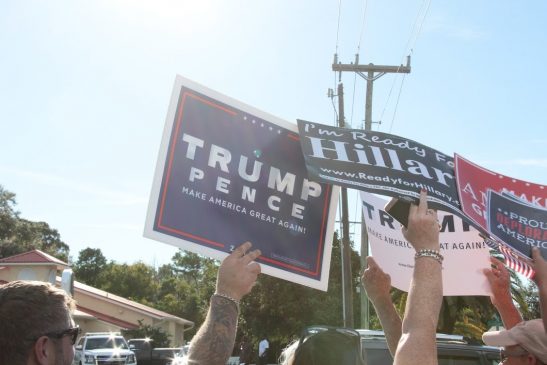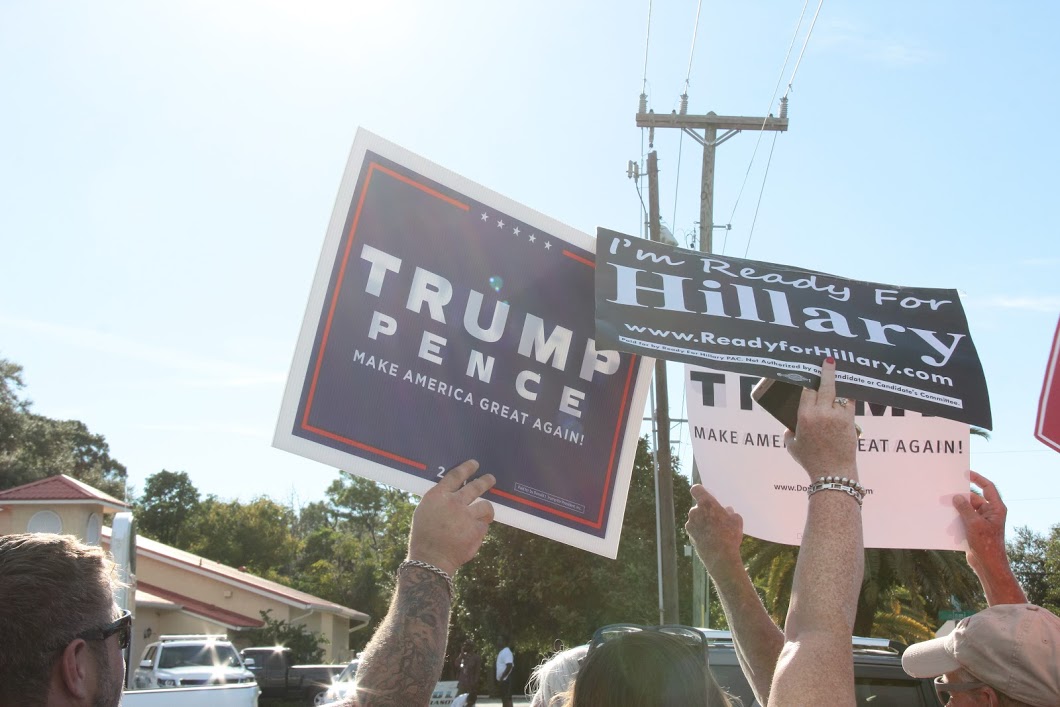When George W. Bush was elected president for his first term, many current thesis students were in kindergarten (first-years might have been toddlers), yet his presidency shaped, and ultimately determined, the outcomes of the most significant political events in our world. While current students were just growing up, a generation of Novo Collegians were facing one of the most important elections of their young lives. Today, we find ourselves in the same position, both mentally, considering the ramifications of our one vote, and physically, on the campus of New College of Florida, in a highly contested swing state.
On Tuesday, Oct. 11, former Democratic presidential nominee and climate change activist Al Gore told Floridians that he is “Exhibit A” to prove that every vote matters in this year’s election. Gore’s loss in 2000, which ultimately came down to a mere 537 votes, has been attributed to Green Party candidate Ralph Nader who siphoned a chunk of votes that some say would have pushed Gore over the edge and into the presidency.
Does New College have a “thing” for third parties?
“Leftist politics in particular has always had a performative element at New College,” alum Jeb Lund (‘97), former political writer for The Guardian, Rolling Stone and Gawker, said in a Facebook message. “Nothing cements your revolutionary bona fides like loudly condemning the insufficient progressivism of your peers, even if it means staking out increasingly thinner territory within an already marginalized wing of the party.”
Most alumni contacted estimated that between half and two-thirds of students in 2000 supported Nader. The significant zeal for the Green Party candidate on the New College campus has led professors and alumni to consider the impact of our small campus on a national, even global scale.
This perception is present even in those who voted for Nader and now feel responsible for a Bush presidency.
“It was my first election, I absentee voted, and Gore was ahead when I voted,” Sara Beall said on Facebook. “Yes, I was one of the Nader votes and I learned a very hard lesson that year. Voting your conscious is not as simple as it seems because it could lead to exactly the outcome you wanted least.”
While Nader support was strong, many students disagreed; tensions were predictably high on campus in the time before the vote.
“I had friends get in knock down drag outs about whether to vote conscience or strategy,” alum Lauren Payne said over Facebook. “It was very divisive.”
“The only real brawl I ever witnessed at New College was on Election Night 2000 between a Gore voter and a Nader voter,” alum Karen Halperin Cyphers said.
A banner reading “GORE COST NADER THE WIN” was hung in Hamilton “Ham” Center after the election.
“I still remember when CNN called Florida for Gore and then went back and gave it to Bush, how shocked and ashamed I felt,” alum Jen Robbins (‘92) said. “For years I didn’t even want to admit that I voted for Nader in that election because I felt so culpable.”

A punchcard ballot from Sarasota county in 2000.
So did New College start the Iraq War and cause global warming?
While the idea of Novo Collegians essentially putting Bush in the White House is provocative (and a great way to convince students how important their vote really is), the real story is much more complicated. In order to say that New College itself cost Gore the election, every student at the time would have had to be registered in Florida and have voted for Nader. A number of other elements were more likely to have had an impact.
Many of those who voted for Nader blame the outcome of the election on the recount that occurred after the close results from Florida. Alum Dave Doherty (‘95), who moved out of Florida before the election, argued that “if Nader voters had instead voted strategically, there may well have been no recount.”
It is nearly impossible to come to a satisfying conclusion as to the exact mechanisms putting Bush into the White House, and similarly difficult to ascertain New College’s effect, if any. In reality, no single group of voters or electoral mistake or butterfly ballot or recount error or corruption or conspiracy can be credibly blamed for the outcome of the 2000 election. Of course, a complex set of circumstances, both in and out of control of his campaign, led to Gore’s loss, but it is nonetheless interesting to evaluate how our small school factored in.
Only 55 (of the fateful 537) votes were cast for Nader in the precinct containing New College dormitories, however a number of students voted absentee to the county where their parents lived, so the actual number of third-party votes coming from students is difficult to estimate. Compared to the 442 votes for Gore and 164 for Bush in the same precinct, NCF’s direct impact seems small, but Sarasota county did have a higher proportion of Nader votes than the statewide average.
Lund holds the “suspicion that New College students as a whole were disproportionately likely to vocally support Nader without necessarily having voted for him.” This idea is supported by one student who had a Nader bumper sticker, campaigned for him, and yet voted for Gore in the booth, and another who donated to the Nader campaign but voted Gore “because it was that important.”
Many students attending New College in 2000 – although they did vote for Nader – did so by voting absentee in their home state, dodging any personal culpability for the fiasco in Florida. Others report not even receiving their ballots in the mail until after the vote.
While the claim that New College students in 2000 actually affected the election results is hard to back up, some concede that the extended New College “family” (alums, professors, etc.) in Florida must have had an effect.
Other progressive actions also contributed to Nader’s success in the Tampa Bay area, including rallies with Michael Moore and endorsement from Tampa radio station WMNF.
Regardless of the actual effect Novos for Nader had, a significant theme among talking to them is learning. Alum Lindsay Moore called the experience “an education in voting strategically,” and Jen Pemberton (‘93) said the election made her “utterly aware of just how important voting is.”
While some Nader voters express regret and guilt for their cast ballot, many of them stand by their vote.
“Do I blame myself for the next disastrous 8 years?” Pemberton said on Facebook. “No, I blame George Bush and his admin.”
“The notion that we are locked into a two-party system is only perpetuated by people who buy into it and support it,” alum Matt Mazzuckelli (‘99) said. “I still remember fellow NCF students berating me for my third party vote, still glad I did it.”
Robbins said, “I still maintain it was naive as hell to vote for [Nader], least of all in such a critical state as Florida, but I also understand why I and so many people were dazzled by him. This time around, I can’t fathom why anyone would vote for Johnson or Stein.”
Then and now
While undoubtedly, support for any third-party candidate at New College this year does not come close to the fervor for Nader in 2000, some students feel the same dissatisfaction with the Republican and Democratic candidates. While support for Sanders is palpable on campus just from a quick glance at bumper stickers in the parking lot, Clinton support is a bit less noticeable. If there are any supporters of Trump on campus, they have not been vocal about it. Those who support third-party candidates have received mixed responses from their peers.
“There was quite a mix between people saying ‘You’re brave, I want to vote third party but I wouldn’t dare be vocal about that at this school’ and the expected ‘How could you even consider voting third party, you’re a Trump supporter!’” Stein supporter and second-year Nika Sigua said.

“I am tired of people always saying that a vote for a third party candidate is a ‘protest’ vote,” first-year transfer student Cesar Chavez said in an email. “It is my right as a U.S. citizen to vote for whoever I want. I am tired of voting out of fear for people whom I do not support and who only care about the rich. That is why I will be voting for Jill Stein, she is the only candidate whose morals and plans I mostly agree with.
“I also believe that in the near future more people will leave the two party dictatorship that is the U.S. and allow parties like the green party or even the libertarian party to grow,” Chavez continued. “I think this has become increasingly obvious with the way the DNC treated Bernie Sanders and was hostile towards him because of his anti establishment stance.”
Third-year and NCF Democrats President George Thurlow threw his support behind Clinton when she won the Democratic nomination, but supported Sanders in the primary. “Many of the Sanders supporters who haven’t been supporting Clinton are convinced that the primary was rigged but I never believed that,” Thurlow said in an email interview. “Hillary Clinton received 3 million more votes in the Democratic primary. She won, fair and square.”
Thurlow never considered opting for a third-party candidate, and said his initial choice, Sanders, knew that running as an independent, “he would be assuring Republican victory, potentially from a very scary candidate.”
In 2000, the lure of the third party has been attributed as a factor leading to Bush’s election. Again, third-party candidates have been criticized for pulling votes away from the main party candidate whose views more closely match theirs.
“You have two choices for President of the United States (third party candidates are nothing more than a distraction in reality),” Thurlow said. “You live in a battleground state. One candidate acknowledges the same issues that Bernie Sanders did but wouldn’t go as far. The other doesn’t and would make things worse for marginalized communities. Choose the better candidate.”
“It’s been brought up to me several times that Florida is a swing state and apparently because of that I should reconsider who I am voting for; I think it’s over-complicating democracy to have to consider that my political ideology should change depending on where I live at the moment,” Sigua said.
Alum Brian Turk (‘97), who voted for Nader in 2000, said he “will grudgingly vote for Hillary” this time around. “I can’t truly say I support her. Jill Stein stands for my values and principles, no doubt. But I will vote for Hillary because I very very much do not want a billionaire real estate developer who boasts about fondling women to be the president. Trump and what he stands for represents me even less than Hillary does.”

Some alums have attempted to “trade” their vote with friends or family in solidly red or blue states where voting green would not significantly alter potential outcomes.
“I remember arranging for several of my relatives and friends in Alabama to vote Nader there (where Gore had no chance) in exchange for a Nader voter voting Gore here in Florida,” alum Richard Butgereit said. Butgereit however said that “social media [was] not prevalent enough to make Nader-Trading a real thing.”
This year, a website called “Trump Traders” has reignited the prospect of vote trading, running on the motto that “Friends don’t let friends protest vote in swing states.”
Recent alum Ganga Braun (‘11) plans to vote for Clinton in Florida while a friend votes for Jill Stein in California, a state with historically little chance of going red.
According to Doherty, “If you want to elect third party candidates, work to get them elected at the local level where this is actually possible. […] The seeds of change are not going to be planted by voting your conscience in a presidential election. In fact, casting a ballot in that way may well work against your purported goals.”
Information for this article was taken from washingtonpost.com, slate.com, greensboro.com. A special thank you to Jono Miller for providing 2000 data from the Sarasota Supervisor of Elections and to everyone on the NC(F) Daimon Facebook page.

